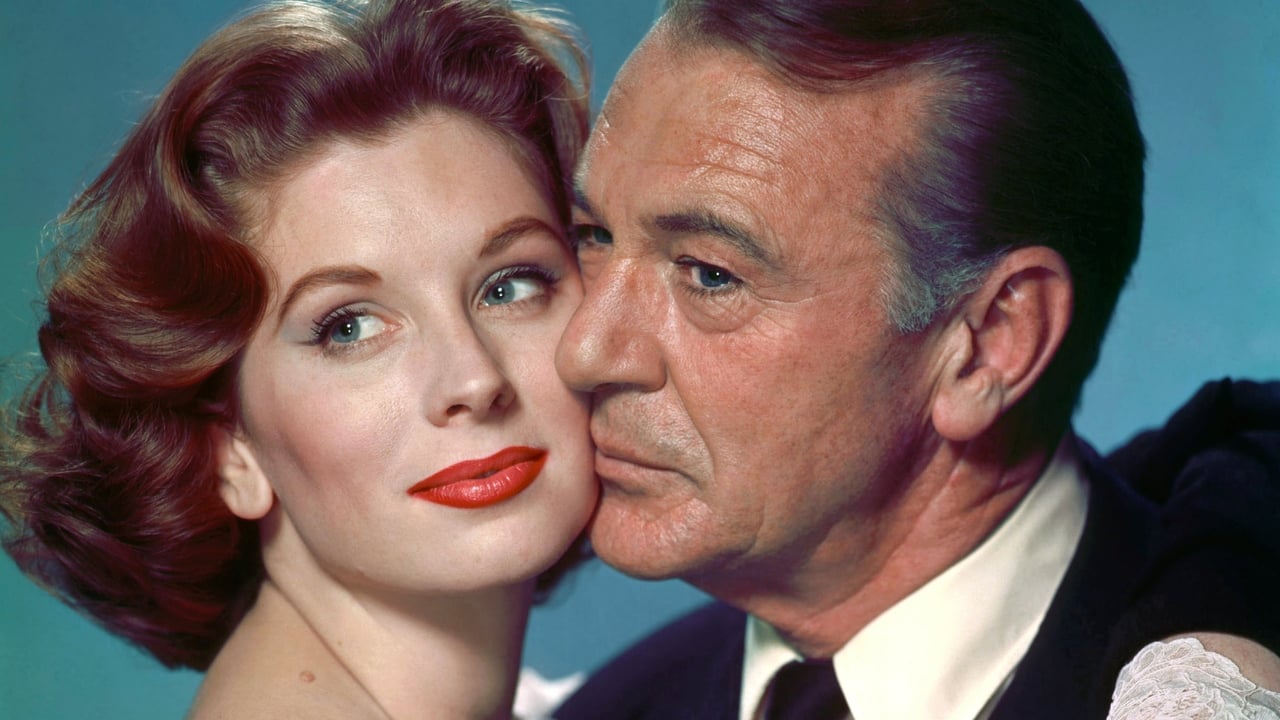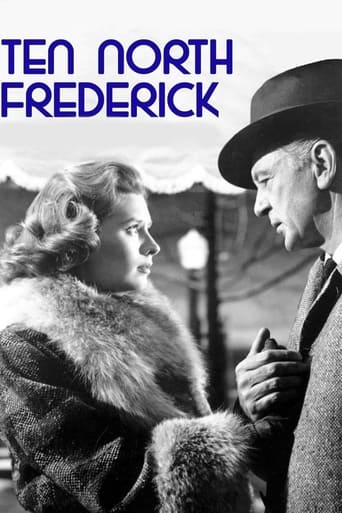

Self-important, over-dramatic, uninspired.
... View MoreAn absolute waste of money
... View MoreIt isn't all that great, actually. Really cheesy and very predicable of how certain scenes are gonna turn play out. However, I guess that's the charm of it all, because I would consider this one of my guilty pleasures.
... View MoreIt is neither dumb nor smart enough to be fun, and spends way too much time with its boring human characters.
... View MorePennsylvania is at the heart of the story of "Ten North Frederick," a movie directed by Philippe Dunne, a filmmaker who mostly worked for Twentieth Century-Fox, where he signed the screenplays of classics such as "Magnificent Obsession", "The Last of the Mohicans", "Suez", "How Green Was My Valley", " Forever Amber" and "The Robe". In 1955 he began directing films and although he did not do great works among the 10 films he made, some are more than acceptable, like "Wild in the Country", one of Elvis Presley's best films; the much appreciated melodrama "The Inspector" with Stephen Boyd and Dolores Hart, or the funny spy comedy "Blindfold" with Rock Hudson and Claudia Cardinale. However, "Ten North Frederick" exceeded my expectations. Filmed in black and white Cinemascope, it is based on a novel by the controversial John O'Hara, described as an irascible Pennsylvania social climber, who could not have a college career at Yale as he wished, when his father unexpectedly died. These facts allowed him to be a keen observer of class differences, which are dramatically expressed in the plot of the film, set in the fictional town of Gibbsville, which O'Hara used several times as the location of his stories. The movie opens with the post-funeral reunion in the mansion of a Gibbsville patriarch named Joe Chapin (Gary Cooper). So it begins a retrospective account of his life: at the age of 50, Chapin's professional plans collapse. His aspirations in the upcoming elections are betrayed by his "image maker" and by the local politicians, but the drama inside his house on 10 North Frederick street is even worse. His upstart wife Edith (Geraldine Fitzgerald) scorns him, she has thwarted their son Joby's (Ray Stricklin) desire of entering Juilliard School to study music, and she is partially responsible of the abortion of their eldest daughter Ann (Diane Varsi) and the breaking of her marriage to a trumpeter of Italian origin (Stuart Whitman). While watching the film, which does not evade dramatic special effects (a great storm lashes Gibbsville during the night of the rupture and the abortion) or Leigh Harline's musical bursts in the most classic melodramatic style, I remembered all the relationships I have seen truncated by differences of class, the prejudices against many who have wanted to study art, the agreements between corrupt politicians who have been discovered but remain in power, or castrating mothers who emotionally destroy their families... But in the final half hour of the film, the story made a sudden turn when Chapin travels to New York to take a break, and looks for his daughter Ann, who has separated from the family. Arriving at her address, he knocks on the door and who opens it is his daughter's roommate, the beautiful Kate Drummond (Suzy Parker). And then a tender love affair surges, but fleetingly, just as a preamble to his final days. In this last movement, the story is honest and Chapin, in a very lucid reflection on old age, says goodbye to Kate: there is no turning back, the deterioration of the man is eminent, the retrospective narration concludes and we return to the present, to the score settling with Mama Chapin. "Ten North Frederick" is perhaps the best kept secret of Dunne's career. Maybe his best film. Discovering it was a very enjoyable experience, as well as watching Gary Cooper once again, one of the greatest actors that the United States has given to cinema, accompanied by a prominent cast.
... View MoreThis is by far the best of the four novels by John O'Hara that have so far been adapted for the big screen (Pal Joey was a volume of short stories - and contrary to what one reviewer states here, O'Hara wrote Ten North Frederick in 1955 and won the National Book Award in 1956 whilst the film of Pal Joey was released in 1957; Chronologically in terms of publication the four novels were Butterfield 8, A Rage To Live, Ten North Frederick and From The Terrace. Although cutting it dramatically - the novel covers the entire life of the protagonist, the film merely the last five years - writer/director Philip Dunne has wisely retained a great deal of O'Hara's dialogue. I've never been a huge admirer of Gary Cooper but he is ideal casting as Joe Chapin, decency personified, whilst it would be hard to improve on Geraldine Fitzgerald as the wife/mother from hell. Cas support several viewings.
... View MoreAlthough Gary Cooper is my favorite actor, this was a movie I had never seen until a few years ago, when I happened to catch it after waking in the wee hours of the morning and turning on the television after not being able to get back to sleep. It seems like this movie isn't very well-respected, but I think it is fantastic and have recommended it to several people. Admittedly, it's not High Noon, but it's quite bittersweet (heartbreaking, even) and has a touch of romance. Gary Cooper's character is a very decent man at heart and truly tries to do the right thing when it comes to the major decisions he has to make, but it seems he can't win being married to such a shrewish woman.
... View MoreI watched this movie last night after having not seen it in many years. In the very first scene we are told it is the year 1945. Then a string of cars are seen pulling up to a house. The second car is a 1950 Lincoln Cosmopolitan which of course did not exist in 1945.
... View More